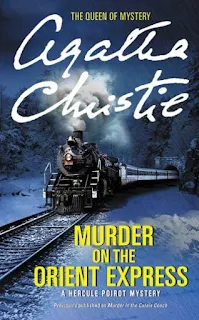“Murder on the Orient Express” by Agatha Christie – Vengeance is Best Served with a Cold Knife
I've already written a couple of reviews of Agatha Christie’s books, so I won’t go spend as much time as I did earlier telling how much of an impact she had on the murder mystery genre, single-handedly revolutionizing certain aspects of it and setting the bar higher than ever before.
While it may be true that some of her novels were groundbreaking, it also has to be noted that on many occasions she preferred to stick to the rules she knew best, and in my opinion it kind of shows in Murder on the Orient Express.
In this book, Hercule Poirot, her famous private detective, is taking a trip aboard a train, when suddenly one of the passengers is discovered to be dead in his compartment, stabbed multiple times, with the strangest fact being that his door is locked from the inside.
Being the detective that he is, Poirot sees the need for him to lead his own investigation and put his hands on the murderer before he or she strikes again.
What’s more, Mother Nature has some tricks up her sleeve as well, forcing the train to be stopped until the emergency services can clear the path.
In other words, they are stuck in the middle of nowhere with certain death awaiting outside the train, meaning that the murderer is still amongst the passengers, not to mention that no outside help can be counted on.
As you can see, this is pretty much a classic setup for a traditional whodunit mystery, with there being no official representative of the law and everyone being stuck together in the same location for the duration of it all.
As usual, Agatha gives us a very compelling murder mystery, which at the beginning seems to be quite convoluted, even going as far as defying logic.
While it is true that this particular story has an ending which is actually quite different from the rest of her stories, there is much more to its charm than that. Simply seeing Poirot unraveling the threads of a web which doesn't seem to have an end is quite fascinating, especially as to the deductions he can make from every single clue and red herring thrown his way.
Once again, as seems to be the case in all of Agatha Christie’s murder mysteries, the characters are quite different from one another, making for a varied cast where every participant has some kind of peculiarity which makes them easily distinguishable from the rest, and even interesting.
All in all, Murder on the Orient Express is about as solid as whodunit murder mysteries get, and I definitely recommend that you read it, regardless of whether or not you’re a fan of Agatha Christie’s works; this is one of those books which can be liked even by those who aren't big fans of the murder mystery genre.
While it may be true that some of her novels were groundbreaking, it also has to be noted that on many occasions she preferred to stick to the rules she knew best, and in my opinion it kind of shows in Murder on the Orient Express.
In this book, Hercule Poirot, her famous private detective, is taking a trip aboard a train, when suddenly one of the passengers is discovered to be dead in his compartment, stabbed multiple times, with the strangest fact being that his door is locked from the inside.
Being the detective that he is, Poirot sees the need for him to lead his own investigation and put his hands on the murderer before he or she strikes again.
What’s more, Mother Nature has some tricks up her sleeve as well, forcing the train to be stopped until the emergency services can clear the path.
In other words, they are stuck in the middle of nowhere with certain death awaiting outside the train, meaning that the murderer is still amongst the passengers, not to mention that no outside help can be counted on.
As you can see, this is pretty much a classic setup for a traditional whodunit mystery, with there being no official representative of the law and everyone being stuck together in the same location for the duration of it all.
As usual, Agatha gives us a very compelling murder mystery, which at the beginning seems to be quite convoluted, even going as far as defying logic.
While it is true that this particular story has an ending which is actually quite different from the rest of her stories, there is much more to its charm than that. Simply seeing Poirot unraveling the threads of a web which doesn't seem to have an end is quite fascinating, especially as to the deductions he can make from every single clue and red herring thrown his way.
Once again, as seems to be the case in all of Agatha Christie’s murder mysteries, the characters are quite different from one another, making for a varied cast where every participant has some kind of peculiarity which makes them easily distinguishable from the rest, and even interesting.
All in all, Murder on the Orient Express is about as solid as whodunit murder mysteries get, and I definitely recommend that you read it, regardless of whether or not you’re a fan of Agatha Christie’s works; this is one of those books which can be liked even by those who aren't big fans of the murder mystery genre.
 | Agatha Christie |








The book is one of the best of Agatha Christie's work. How a man can be murdered by someone behind a locked compartment door and with train in a standstill position amidst the snowy countryside how can he escape?? How the murderer can be tracked among the different passengers travelling? These are just of the few question that will hover your mind till the end. A masterpiece.
ReplyDelete